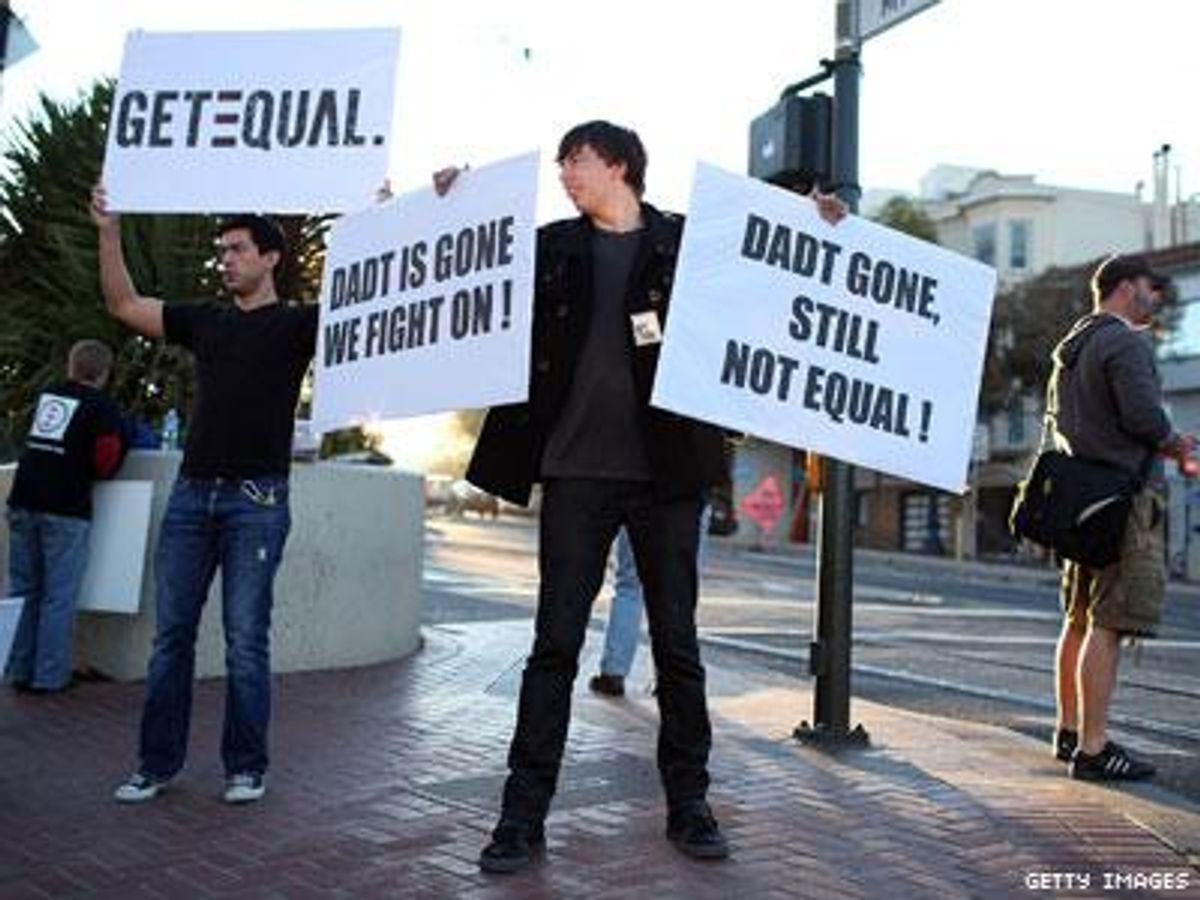As the Pentagon marks one year this month since the end of its "don't ask, don't tell" policy, which barred openly gay men and women from serving in the U.S. military, what is perhaps most remarkable is how unremarkable the past year has been given the dire predictions of many before the ban was lifted. There has been no mass exodus of soldiers or military chaplains from the service. There have been no reports of widespread disruptions to military units that count openly gay soldiers among their ranks. In June the Pentagon even hosted its first-ever LGBT pride month ceremony to honor the very troops it once fired under the discriminatory policy.
The fact that gay soldiers can now serve openly, however, does not mean they do so equally. The continued enforcement of the Defense of Marriage Act forces the Pentagon to treat married gay soldiers differently from their heterosexual counterparts. By restricting definitions of marriage to one man and one woman, DOMA and other federal regulations prevent married gay couples from automatically qualifying for a host of military benefits, even if they are wedded in states where such unions are legal. Although repeal of "don't ask, don't tell" has allowed gay and lesbian soldiers to serve openly without fear of being discharged, DOMA inhibits their integration into the U.S. military on a full and equal basis.
As a student of military affairs and a supporter of a strong national defense, I shared the assessment of Admiral Michael Mullen, then-Chairman of the Joint Chiefs of Staff, when he told Congress that repealing "don't ask, don't tell" would make for "a stronger military." Among other reasons, it would make it possible for patriotic citizens like me to consider serving our nation in ways that were once out of reach. But after sifting through hundreds of pages of Congressional hearing transcripts, Pentagon studies, and survey data from U.S. service members as part of a year-long research endeavor on "don't ask, don't tell" repeal, I encountered the often overlooked irony that allowing gay and lesbian soldiers to serve openly has revealed lingering inequalities in the way these service members are treated.
Current federal law requires the Pentagon to classify legally married gay and lesbian soldiers as "single" for the purpose of benefits eligibility. As a result, the Defense Department is barred from extending military health care coverage to same-sex spouses, and under current regulations gay couples are unable to qualify for the "with-dependent" rate for the military's Basic Allowance for Housing program, which helps subsidize housing costs for soldiers and their families living off-base.
The costs these restrictions impose on gay soldiers are not trivial. According to a recent Pentagon-sponsored study on regular military compensation, enlisted personnel with dependents make as much as $3,800 more annually than those who are classified as single, owing to the higher housing allowance and the associated tax advantage that comes from this non-taxed income. These differences do not even account for the savings afforded to military family members that qualify for certain survivor benefits and coverage under its health care system. Unless they have children, gay soldiers in recognized partnerships - even those legally married in states like New York and Massachusetts - are denied these significant savings and allowances since their same-sex partners do not qualify as "dependents" under current federal law.
There are some benefits same-sex partners can receive - such as payments from group life insurance policies, hospital visitation access, and the posthumous distribution of funds from a soldier's retirement savings account - so long as soldiers specifically identify them as beneficiaries.
Extending other benefits, however, would require the Defense Department to rewrite its regulations or create a separate classification for committed same-sex partners to qualify. Although the State Department and other federal agencies have adopted this approach, this seemingly "separate but equal" arrangement could create its own inequities should committed, but unmarried, heterosexual partners be denied the same privileges.
An easier and more equitable solution would be for Congress to simply repeal the Defense of Marriage Act. Doing so would reduce ambiguity regarding benefits eligibility for same-sex couples and place the burden of revising federal policy on our elected representatives - not the military - to ensure that legally married gay soldiers are treated equally.
Although California Sen. Dianne Feinstein has introduced legislation that would repeal DOMA, Congress' inability to act has left the Defense Department and federal government vulnerable to litigation as gay service members and veterans challenge the constitutionality of DOMA in court. A judicial ruling abruptly striking down the law would be disruptive to the military's preference for an orderly and fiscally sound transition toward a benefits system for which same-sex partners qualify. Only by having Congress repeal DOMA itself can the Pentagon avoid this fate.
The military should not be on the front lines of the nation's culture wars. That is not its job. But when the military's ability to treat its own soldiers equally is inhibited by laws made by Congress, the ramifications of such decisions on men and women in uniform must be taken into account. The Pentagon has contended that extending certain benefits to married same-sex couples could actually improve the combat readiness and performance of gay and lesbian soldiers in the field, who would be comforted by the knowledge that their family members are supported during times of deployment stress. Lawmakers should do everything possible to lighten these burdens for all soldiers regardless of sexual orientation.
By repealing the Defense of Marriage Act, Congress will ensure that gay and lesbian soldiers can serve our nation to the best of their abilities and make certain that the discriminatory legacy of "don't ask, don't tell" is finally put to rest.
THEO MILONOPOULOS researched "don't ask, don't tell" repeal as a Fulbright scholar at King's College London. He is currently undertaking doctoral studies in political science at Columbia University.


















































































